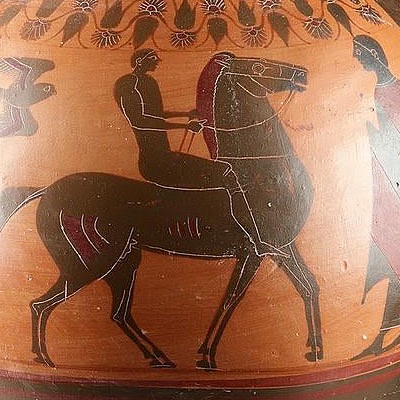19th C Native American Cheyenne Buffalo Hide Tipi Liner
Lot 156
About Seller
Artemis Fine Arts
686 S Taylor Ave, Ste 106
Louisville, CO 80027
United States
Selling antiquities, ancient and ethnographic art online since 1993, Artemis Gallery specializes in Classical Antiquities (Egyptian, Greek, Roman, Near Eastern), Asian, Pre-Columbian, African / Tribal / Oceanographic art. Our extensive inventory includes pottery, stone, metal, wood, glass and textil...Read more
Estimate:
$65,000 - $97,500
Absentee vs Live bid
Two ways to bid:
- Leave a max absentee bid and the platform will bid on your behalf up to your maximum bid during the live auction.
- Bid live during the auction and your bids will be submitted real-time to the auctioneer.
Bid Increments
| Price | Bid Increment |
|---|---|
| $0 | $25 |
| $300 | $50 |
| $1,000 | $100 |
| $2,000 | $250 |
| $5,000 | $500 |
| $10,000 | $1,000 |
| $20,000 | $2,500 |
| $50,000 | $5,000 |
| $100,000 | $10,000 |
| $200,000 | $20,000 |
About Auction
By Artemis Fine Arts
Jun 4, 2020
Set Reminder
2020-06-04 10:00:00
2020-06-04 10:00:00
America/New_York
Bidsquare
Bidsquare : Exceptional Antiquities, Asian, Ethnographic
https://www.bidsquare.com/auctions/artemis-gallery/exceptional-antiquities-asian-ethnographic-5185
An important one-day auction featuring museum-worthy examples of Egyptian, Greek, Roman, Etruscan, Near Eastern, Far East / Asian, Pre-Columbian, African / Tribal, Oceanic, Native American, Spanish Colonial, Russian, Fossils, Ancient Jewelry, Fine Art, so much more! Artemis Fine Arts info@artemisgallery.com
An important one-day auction featuring museum-worthy examples of Egyptian, Greek, Roman, Etruscan, Near Eastern, Far East / Asian, Pre-Columbian, African / Tribal, Oceanic, Native American, Spanish Colonial, Russian, Fossils, Ancient Jewelry, Fine Art, so much more! Artemis Fine Arts info@artemisgallery.com
- Lot Description
Native American, Plains, Cheyenne, reservation period, ca. 1850 CE. A very large tipi (also tepee and teepee) liner comprised of 5 large stitched brain-tanned buffalo hide panels that were sinew sewn and painted with geometric motifs. This is a liner rather than a cover that was intended for a 14 to 16 foot tipi. The decorative program is comprised of 9 vertical stylized columns, each one with a double outline in cornflower blue, a central yellow band and 4 diamond-shaped motifs comprised of opposing triangles in russet red and cornflower blue with a blue outlined yellow square at the center punctuating the central yellow band. A tipi liner is similar to a grand curtain hung on the tipi's lower walls to provide protection from drafts and rainwater as well as to create another layer of privacy. This example, with its attractive geometric motifs was likely painted by women (see below). Size: 350" L x 78.75" H (889 cm x 200 cm)
According to Josh Garrett-Davis' review of the Brooklyn Museum's 2011 exhibition entitled "TIPI: Heritage of the Great Plains" (The Brooklyn Rail: Critical Perspectives on Arts, Politics, and Culture), when liners are created by women, their decorations are traditionally geometric motifs; however, when painted by men, they usually represent pictorial narratives of battle scenes commemorating courageous exploits that are largely autobiographical. Given the geometric decorative program on this tipi liner, we gather that it was painted by women. See a Cheyenne painted muslin tipi liner with painted geometric motifs in the Portland Art Museum (2003.65.7).
A pictorial painted muslin (rather than hide) tipi liner sold at Christie's East for USD 32,200 (1998, sale 8181, lot 501).
Another aesthetically similar example of a tipi liner from the Pikuni Blackfeet tribe can be seen at the Smithsonian Institution, catalog number 14/9524.
Provenance: private Glorieta, New Mexico, USA collection; collected approximately 50 years ago in Wyoming by a former tipi maker
All items legal to buy/sell under U.S. Statute covering cultural patrimony Code 2600, CHAPTER 14, and are guaranteed to be as described or your money back.
A Certificate of Authenticity will accompany all winning bids.
We ship worldwide and handle all shipping in-house for your convenience.
#149226There are 3 large ovoid repairs, about 12-15 unrepaired tears, about 12-15 unrepaired perforations, several missing ties (2 from the top, 6 from the bottom, 8-10 from the sides), scuffs, minute punctures, and staining that is most evident along the lower body of the piece (more visible on the verso). The painted designs are nice and vivid.Condition
- Shipping Info
-
All shipping is handled in-house for your convenience. Your invoice from Artemis Gallery will include shipping calculation instructions. If in doubt, please inquire BEFORE bidding for estimated shipping costs for individual items.
-
- Buyer's Premium



 EUR
EUR CAD
CAD AUD
AUD GBP
GBP MXN
MXN HKD
HKD CNY
CNY MYR
MYR SEK
SEK SGD
SGD CHF
CHF THB
THB




















